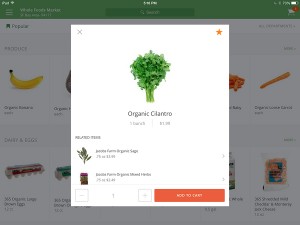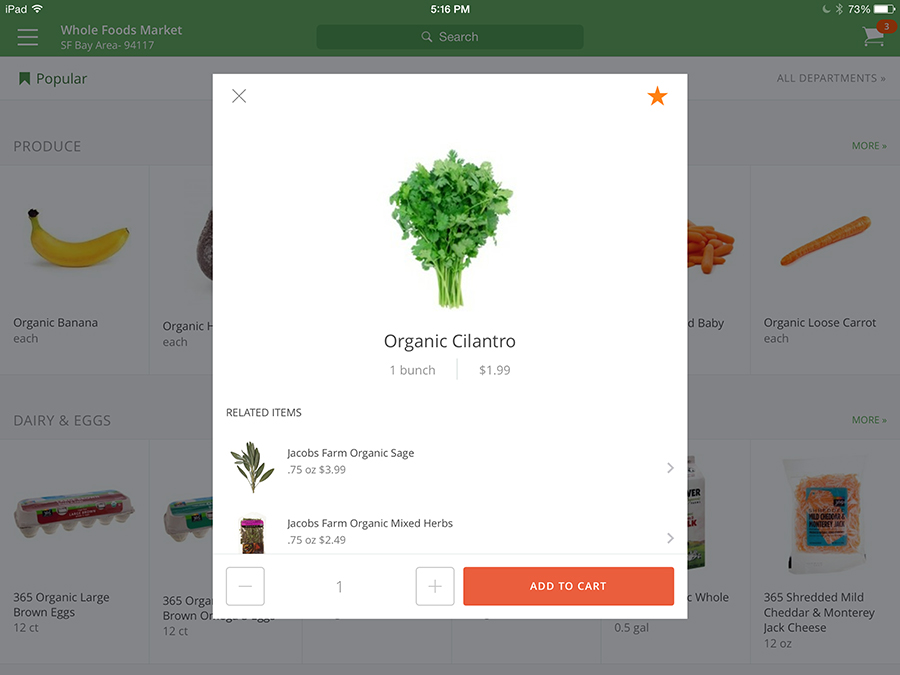Instacart delivers groceries to students’ doorsteps
From his Twitter handle (@Max) to his business strategy, USC graduate and successful businessman Max Mullen is straightforward and succinct.
Mullen, a 2007 graduate of the Marshall School of Business, spared no more than a few words to describe his philosophies for co-founding successful new grocery delivery service, Instacart.

Fast food · From organic cilantro to Pacifico Clara beer, Instacart delivers fresh groceries right to your door within an hour. Participating stores include Costco Wholesale, Whole Foods Market, Super King and Ralphs. — Photo courtesy of instacart.com
Started in 2012, Instacart is a “unique marketplace between customers and shoppers,” and Mullen said he would have loved to have had the service when he was a student.
The app, available on computers and smart devices, allows users to pick out items from local grocery stores to be purchased and delivered by personal shoppers in as little as an hour, with delivery times as fast as 12 minutes. The Instacart app and membership is free, while delivery options range from $3.99 for two-hour delivery to $9.99 for one-hour delivery. Instacart’s grocery delivery service is available in 12 major cities around the U.S., including Los Angeles.
“Our approach is unique compared to others that were some spectacular flameouts,” Mullen said, pointing out that the company uses existing infrastructure to offer same-day delivery.
The company raised $44 million dollars in funding this past June, for a total of $55 million of support to date, according to Forbes.
Mullen, who founded two startups before Instacart, attributes much of his business achievement to his time as a student at USC, where he studied entrepreneurship in the Marshall School of Business.
His interest in business stems from watching his father work in the business world when Mullen was younger.
He lists film professor Drew Casper as a major influence who taught him the components of a good story and the importance of a story arc — skills he uses daily.
“As a founder of a startup, you’re telling your company’s story everyday to a new audience,” Mullen said.
Many of the concepts Mullen says he still finds relevant come from his classes in the entrepreneurship program, where he was able to meet successful business owners, such as the founder of online trading company E*Trade, as well as business owners whom had failed. Hearing about their journeys and learning from their mistakes were valuable educational tools, according to Mullen.
Mullen continues to stay involved with the Trojan family through football and is still in touch with many of the connections he made at USC. “I just interviewed a Trojan today, and I could tell he was a Trojan as he was so strong in certain aspects,” he said.
Mullen advises young entrepreneurs to utilize feasibility analysis, a tool taught in business classes that allows startups to gauge interest in their product idea through calculated surveys.He says beginners should make sure to identify a need or problem that requires addressing before proceeding.
“You don’t need to start a business, to know if a business is going to run,” Mullen said.
Regardless, entering the real world sharing economy, as Instacart is, comes with challenges that companies like ride-sharing Uber and home-sharing Airbnb are quickly finding as they face high-profile lawsuits.
Instacart has avoided hiccups in its two years of operation, which can be attributed to its comprehensive training process for personal shoppers, according to Mullen. Because the shopper-customer interaction is vital, shoppers are well-paid and receive 100 percent of their tips. Mullen said the company looks for a passion for food in their shoppers, an attribute that is relayed in its positive reviews.
Instacart’s Los Angeles city manager Walker Dieckmann said the company environment is unparalleled in his experience.
“The culture they’ve created here is one of solving problems and innovating quickly and proactively,” Dieckmann said. “We are always finding new ways to help our customers, and meet their needs.”
Instacart’s users also cite convenience and ease of use as positives in the use of the app, despite price differences between the stores and the app.
Wall Street Journal reviewer Geoffrey Fowler cited his personal shopper experience as well-intentioned but “they’re not delivery professionals,”nevertheless recommending Instacart as the best service for those who want groceries quickly.
Mullen says the app is popular with moms, families and urban professionals.
“These are people who understand the tradeoff between time and paying for convenience.”
Dieckmann said the company is expanding at a rapid rate, and has added two new cities every six weeks for the past four months. In the future, they hope to add growing numbers of available stores and cities.
“My hope is that the name becomes ubiquitous and synonymous with grocery delivery,” Dieckmann said.
Los Angeles area users should look out for major expansion early September with two local favorite chains, as well as added zones of delivery.

